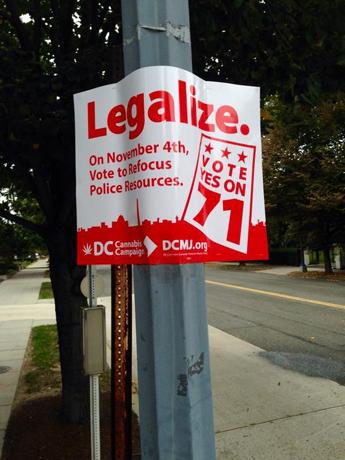Few D.C. Surprises: After All That Campaigning, It’s Bowser . . . Oh, Yeah, Pot Will Be Legal
By • November 10, 2014 0 900

Even unto the last days of the District of Columbia’s race for mayor, there had been buzz — vague and misty, but still — that this could be a tight race, that there remained an unsettled atmosphere and that there was a chance — slim, but still — that Independent challenger David Catania might pull off an upset.
Part of the reason that prospect even existed at the late hour was that Catania had, like favorite Muriel Bowser, hustled in the hustings, knocking on doors. According to some polls, early in the fall, he had cut Bowser’s early double-digit lead down to singles, although his momentum appeared to have stalled.
Still during the last days of the campaign, there was that little buzz in the media — vague and misty, but still — although none of it was coming from the Bowser campaign, or Bowser herself, who looked serene and confident when we talked to her just a few days before the election.
At that time, we asked her how it felt after all the effort—she won the D.C. Democratic Primary handily over Mayor Vincent Gray, and Tommy Wells, Jack Evans and Vincent Orange back in April and kept up a efficiently organized, low-key, non-confrontational, four-debate campaign — she was in a campaign considered by some to be competitive.
She considered that. “Is it?” she asked.
The guess here is she knew something, because Bowser swamped Catania, the now former at-large District Councilmember of considerable achievement right from the get-go, jumping out to a 20-point lead and never looking back, right up to the moment where she danced to the Alicia Keys’s song “Girl On Fire” at her victory party at the renovated Howard Theatre.
The result: Bowser, 80,824 votes, or 55.0 percent; David Catania, 52,800 or 36 percent; and 10,616 votes (7.2 percent) for Independent former at-large District Councilmember and four-time mayoral candidate Carl Schwartz.
Bowser, at the victory party, and at the National Press Club the following day, stated that she had “a clear mandate” for a “fresh start” and that the status quo would not be enough. As in her campaign, she stuck to grand themes and provided few policy details.
There were few surprises in the D.C. election as a whole, but there will be three more new council members. They include Elissa Silverman, (economics expert and former “Loose Lips” columnist) who finished behind incumbent Anita Bonds in the crowded (at least 17 candidates, most of them newly minted Independents) race to fill two council at-large seats, including the one abandoned by Catania. In Ward 1, there’s Brianne K. Nadeau, who unseated incumbent Jim Graham in the Democratic Primary in April, and in Ward 6, there’s Charles Allen, who took over the seat of Tommy Wells, who had to give up his seat to run for mayor and lost in the Democratic primary. Allen was Wells’s chief of staff.
Winning re-election were Mary Cheh in Ward Three and Kenyon McDuffie in Ward 5.
In the first-ever race for District of Columbia Attorney General (formerly an appointed position), veteran D.C. lawyer Karl Racine won easily, a bitter pill to swallow for Adams Morgan lawyer Paul Zukerberg, who had almost solely led the campaign to get the measure to make the attorney general be an elected office. Zukerberg, undermanned and under financed, finished fifth.
Eleanor Holmes Norton easily won re-election to her post as D.C. Delegate (non-voting) to the House of Representatives.
Initiative 71—legalization of marijuana—also won easily—with only the one precinct in the District opposing. Of course, given that Congress messes with D.C. legislation, budgets and laws routinely—especially with the GOP roll-over in the mid-term elections, this is not entirely a done deal, depending on what GOP lawmakers do.

